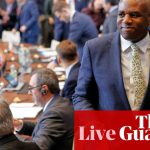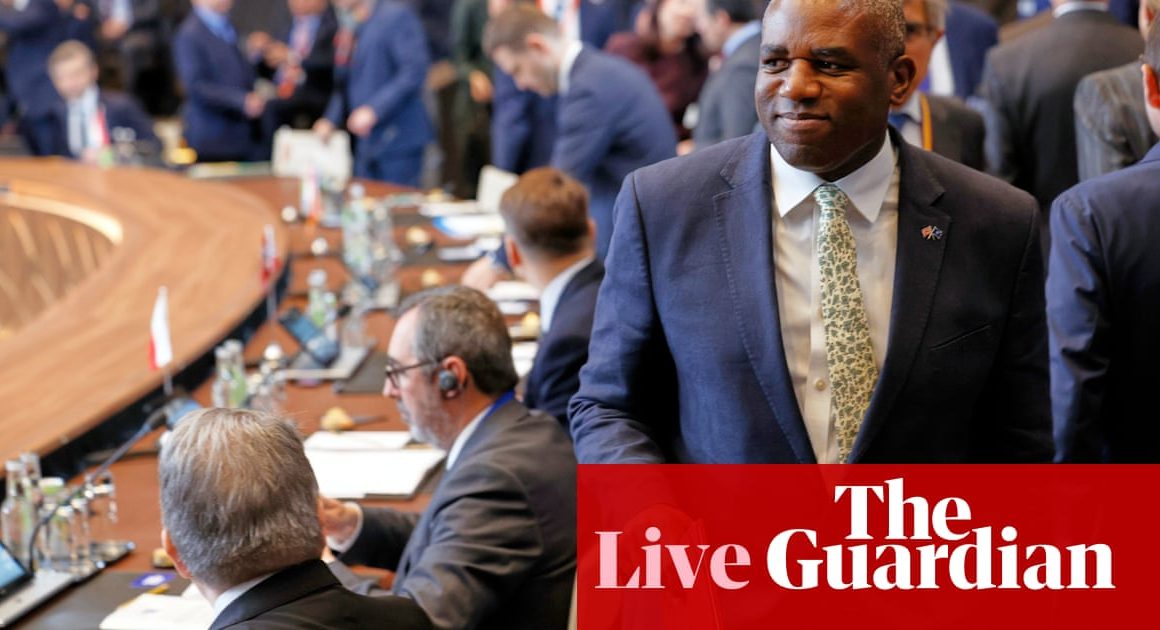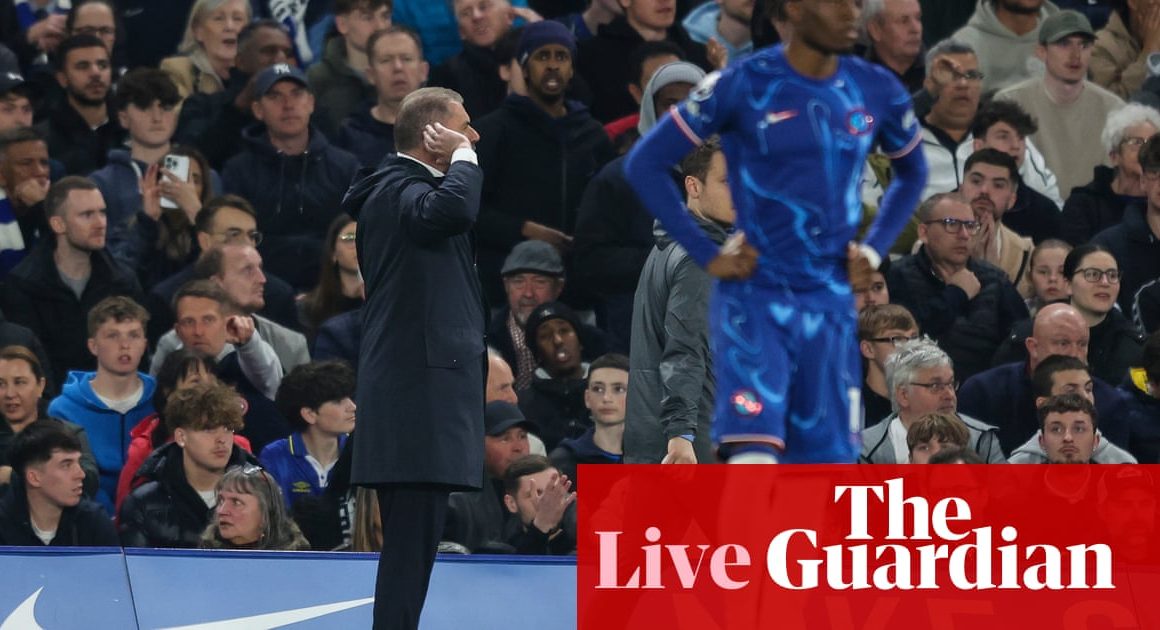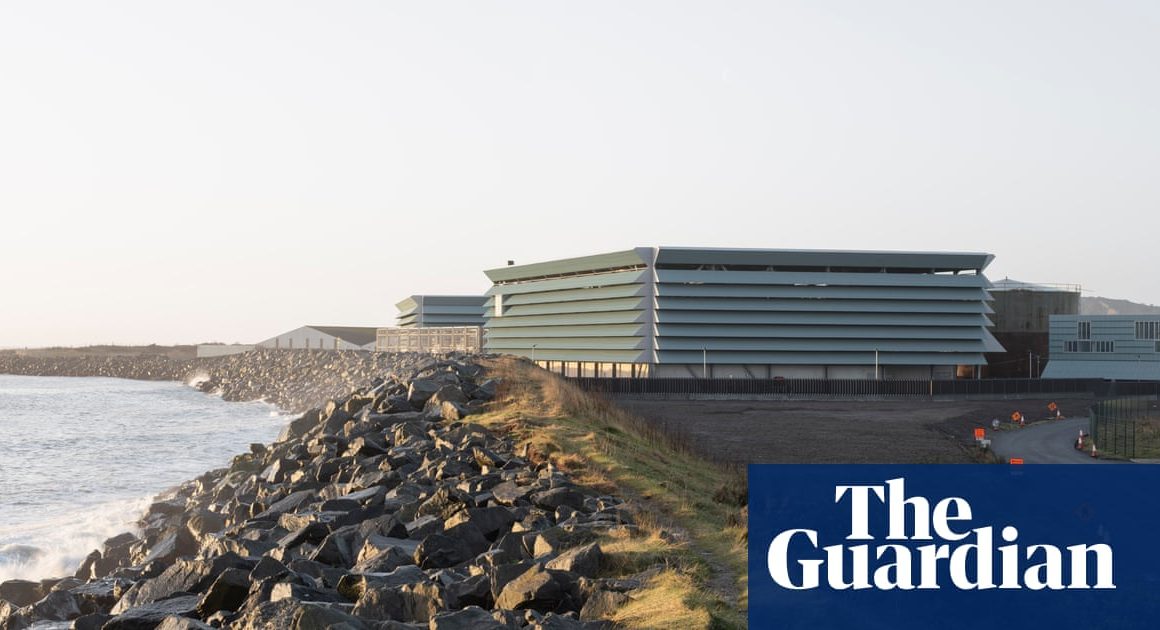Key events
More reaction is coming in to the UK’s new emissions cut target revealed by the Guardian last night. It has generally been warmly welcomed, though with some caveats.
Zahra Hdidou of ActionAid said:
With a planet battered by severe floods, storms, and heatwaves—and a climate denier elected to the White House—the UK is setting a bold bar for climate action at Cop this year. Yet this commitment risks being sabotaged by a costly obsession with carbon capture and storage— a false climate solution that hands a dangerous lifeline to the fossil fuel industry. Adding further insult to injury, the UK continues to pour over £5bn in public subsidies each year into polluting industries, diverting valuable funds away from where they’re truly needed while adding fuel to the climate fire.
Rebecca Newsom of Greenpeace said:
Despite the shadow cast over this summit by the prospect of Trump 2.0, Keir Starmer is choosing to step up, instead of stepping back from climate action. Despite falling short of the UK’s fair share, this is a relatively ambitious target compared with many other nations, and will help build momentum at these talks. But targets need to be backed up with bold action. When the government submits its action plan next year, it must include details of how the UK will deliver a full phase out of oil and gas, as it has done with coal. This must include proper funding to help workers transition from high carbon jobs to the green industries of the future. As our planet reels from catastrophic floods in Spain and bakes in what is likely to be the hottest year on record, this is the bare minimum needed to limit warming to 1.5C.
My colleague Fiona Harvey spotted some performers waiting to take to the stage for the ceremony
The “cultural segment” of the high-level leaders’ event has begun. It features a lot of brightly lit shots of the countryside with the saturation level turned up to the max, smiling children picnicking and shots by drones soaring through mountain passes, all backed by an cheerful if intense orchestral score.
This is followed by a singer in a dinner jacket singing something rousing, although sadly translation was not provided. It is interspersed with shots of the watching delegates looking appreciative if slightly nonplussed.
Next up is some lively folk music from two tar players, backed by the orchestra and played at a pace that feels as though it could be intended to increase the pressure the delegates are feeling to get a positive result. They are followed by a violinist in front of a backdrop of crashing waves and sunlight reflected on water.
Dharna Noor
In the halls of Cop29, activists from Oil Change International gathered around a computer to watch a Dutch court’s ruling on a major ruling.
In this morning’s verdict, the Dutch appeals court struck down a 2021 ruling ordering oil and gas giant Shell to cut emissions by 45% by 2030 from 2019 levels. The activists were devastated.
Laurie van der Burg, Oil Change International, said: “While we mourn today’s setback, the movement for climate justice is only getting stronger. Around the world, movements are increasing pressure on Shell and other big polluters for continuing to aggressively drive the climate crisis, through fossil fuel expansion and lobbying to obstruct, weaken, and delay climate policies.”
Despite the major setback, Van der Burg remained optimistic about future lawsuits against big oil, noting that at least 86 lawsuits have been filed against fossil fuel producers globally.
“Rich fossil fuel producing countries gathering in Baku this week should take notice,” she said. “Unless they stop propping up fossil fuels with billions of dollars in subsidies and instead take responsibility for paying the climate finance they owe to the global south they too will be held responsible in court. We’re just getting started.”
The ruling cited March 2024 research by Oil Change International which showed Shell’s climate plans are out of step with the goals of the Paris climate accord.
The Guardian has a full report below, which will be updated further as reaction comes in:
2024 “a masterclass in climate destruction,” says UN chief

Damian Carrington
“2024 – a masterclass in climate destruction.” That is how UN secretary general António Guterres started his address to world leaders at Cop29 on Tuesday.
“Families running for their lives before the next hurricane strikes; Workers and pilgrims collapsing in insufferable heat; Floods tearing through communities, and tearing down infrastructure; Children going to bed hungry as droughts ravage crops. All these disasters, and more, are being supercharged by human-made climate change,” he said.
The world leaders event happens at the start of Cop, intended to spur and inspire their negotiators towards a strong final agreement. But it was Guterres that read the riot act, with very strong words on the human cost of the climate crisis, and the extreme urgency of action.
“No country is spared,” he emphasised, with global supply chain shocks sending prices soaring for everyone. “Unless emissions plummet and adaptation soars, every economy will face far greater fury.”
“But there is every reason to hope,” Guterres said, with nations having already pledged to transition away from fossil fuels at last year’s Cop28. “It’s time to deliver and humanity is behind you.”
With solar and wind the cheapest source of new electricity almost everywhere, “doubling down on fossil fuels is absurd,” he said. “The clean energy revolution is here. No group, no business, and no government can stop it. But you must ensure it is fair and fast.”
Guterres listed three priorities. First “emergency” emissions reductions, with the G20 countries leading. Second, protecting people from the ravages of the climate crisis, especially the most vulnerable, which will require hundreds of billions of dollars. Third, delivering the overall finance goal, which should be at least $1tn a year and is the key task at Cop29.
“Developing countries eager to act are facing many obstacles: scant public finance; raging cost of capital; crushing climate disasters; and debt servicing that soaks up funds,” he said. “Developing countries must not leave Baku empty-handed. A deal is a must.”
Guterres highlighted both government funding, cheap loans from development banks and “innovative” sources, particularly levies on shipping, aviation, and fossil fuel extraction. “Polluters must pay,” he said.
“The world must pay up, or humanity will pay the price,” he said. “Climate finance is not charity, it’s an investment. Climate action is not optional, it’s imperative. Both are indispensable to a liveable world for all humanity.”

Ajit Niranjan
The UN and the Cop presidency have celebrated last night’s early breakthrough on carbon credits rules that pave the way for a carbon market. “Yesterday we secured critical progress on one of our key priorities, article 6” said Azerbaijan’s lead negotiator Yalchin Rafiyev, referring to a fraught section of the Paris agreement that has frustrated climate negotiators for nearly a decade. The move is a “gamechanger to direct resources to the developing world and save up to $250bn a year to implement climate plans,” he said.
Carbon markets let rich countries and companies pay poor ones to cut emissions and count the savings on their own. It’s a process that can speed up climate action by plucking cheap and low-hanging fruit first, but runs the risk of being abused when underwhelming or harmful projects are credited, or when projects are double-counted.
NGOs reacted with anger to the way in which the rules were pushed through on Monday night, describing it as a “backdoor deal”. The supervisory body adopted new standards ahead of the summit and recommended the parties to approve it, breaking with previous years in which it had given negotiators a set of recommendations to discuss.
Maria Aljishi, chair of the supervisory body, said further work was being done to develop standards at a press conference on Tuesday. “We absolutely must follow due process at all times. The CMA [parties to the Paris agreement] are free to give the supervisory body any guidance, and we are more than happy to receive that guidance and act on it.”
The world leaders in attendance have posed for the traditional “family photo” before the high-level segment gets under way.
It is notably more sparsely attended (and rather less grand) than the equivalent image taken at Cop28 last year:
Officials from the Taliban are attending Cop29, the first UN climate conference they have been at since they took power in Afghanistan in 2021.
Because the organisation is not formally recognised by UN member states, the group cannot participate fully in proceedings but were invited by hosts Azerbaijan to “potentially participate in periphery discussions and potentially hold bilateral meetings,” according to a report by news agency Reuters.
Afghanistan has suffered from drought for decades and is one of the countries most vulnerable to the effects of climate breakdown.
The UN has announced the provisional number of participants in the year’s conference: 66,778. This includes everyone from heads of government to security staff to journalists.
The number is significantly down from the 83,884 who attended last year’s talks in the United Arab Emirates, although it is still far higher than all other previous events. Numbers of attendees have been rising rapidly in recent years; Cop27 had about 49,704 delegates attend, while Cop26 in Glasgow hosted 38,457.
The UNHCR, the UN’s refugee body, has released a report today on how climate breakdown is making life even more difficult for people fleeing war and persecution.
It finds that three-quarters of the 120 million displaced people around the world are in countries severely affected by climate breakdown, and that by 2040 65 countries around the world are expected to face “extreme climate-related hazards”.
The report finds that those living in “extremely fragile states” receive about $2 of adaptation funding each per year, compared with $161 in non-fragile states. It also finds that the vast majority of that funding goes to those in capital cities, overlooking those in rural areas.
Filippo Grandi, the UN’s high commissioner for refugees, said: “The climate emergency represents a deep injustice. People forced to flee, and the communities hosting them, are the least responsible for carbon emissions yet are paying the highest price. The billions of dollars in climate financing never reach them, and humanitarian assistance cannot adequately cover the ever-widening gap. Solutions are at hand, but we need urgent action. Without proper resources and support, those affected will be trapped.”
Keir Starmer to announce UK’s new climate goal
The UK is to announce its new NDC, or nationally determined contribution, at the conference today. My colleague Fiona Harvey revealed last night that it will commit to an emissions reduction of 81% on 1990 levels by 2035.
The target is in line with the recommendation made by the government’s official advisers, the Climate Change Committee. Although campaigners have said the target should be considered the bare minimum the UK should commit to, privately many will feel relieved the target is not lower.
The UK is currently off track to meet its 2030 commitment of a 68% cut in emissions on 1990 levels, having reduced its ambition under the Sunak government.
Read the full story here:
World leaders to speak at day two in Baku

Fiona Harvey
After a rather frustrating first day, when disagreements over the agenda led to delays and false starts, today is – or should be – the day Cop29 really gets going. Put another way, it’s when the circus comes to town, because security ramps up meaning no one can get anywhere, the corridors are packed with guards and camerapeople, and for this segment of the conference world leaders get to bask in the spotlight.
This is the start of the World Leaders Climate Action Summit, when heads of state and government arrive. This year, there will be notably fewer from big developed countries than could usually be expected.
After the election of Donald Trump, Joe Biden will not be putting in an appearance, and the beleaguered US delegation are looking anxious. Xi Jinping of China has made a habit of staying at home for Cops. Germany’s Olaf Scholz is facing the dissolution of his coalition, so he won’t be coming.
European Commission president Ursula von der Leyen is stuck in the midst of confirmation hearings for her cabinet, which also means that Cop veterans Teresa Ribera – the dynamic former Spanish environment minister who has galvanised previous Cops – and Dan Jorgensen, the former Danish environment minister who has been a steadying presence since his first Cop in Copenhagen in 2009, will also be stuck in Brussels. Emanuel Macron of France has an ongoing crisis to cope with so is staying in Paris, from where he yesterday waved off Keir Starmer, one of the few heads of major economies to hit Baku.
Starmer is expected to unveil the UK’s NDC and boost the prospect of private sector cash ramping up to join the public money that is expected to be pledged here, through a deal that will see a key climate fundraising vehicle listed in London.
He will be joined by Hungary’s Viktor Orbán, Recep Tayyip Erdoğan of Turkey, and others.
There will also be plenty of space given to developing countries to make their points. Mia Mottley of Barbados is here, an electric presence at previous Cops whose ideas for a revolution in climate finance are now becoming mainstream.
For Azerbaijan’s presidency, today will be crucial for national prestige. They will look to capitalise on the presence of leaders to give the instructions to their negotiating teams that are needed to unlock the talks. Behind the scenes and the public speeches, they will try to ensure that political leaders don’t get away with just an exchange of warm words and some photo opportunities.
Welcome to the Guardian’s live coverage of the Cop29 climate conference, where Tuesday is the first day of the world leaders’ event. The Guardian’s reporters will be bringing you updates from the ground and around the world. I’m Alan Evans, my colleague Damien Gayle will be taking over later, and you can reach us at cop29@theguardian.com.












